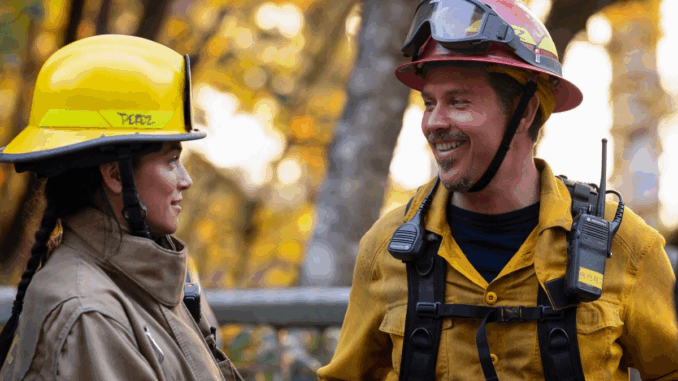
For much of his tenure at the Three Rock Conservation Camp on CBS’s Fire Country, Brett Richards has been, to put it mildly, the abrasive antagonist. He’s the guy who pushes back against Bode Leone’s (Max Thieriot) attempts at leadership, undermines Manny Perez’s (Kevin Alejandro) authority, and generally acts as the abrasive, self-interested embodiment of the “old-school” convict mentality. He’s the character fans love to hate—the necessary friction that drives the drama within the confines of the camp.
However, in Season 4, Episode 4, titled “The Long Road Home,” Brett Richards finally broke through his own armor. The episode featured a deeply moving, pivotal moment that peeled back the layers of cynicism and resentment, revealing the genuine pain and desire for redemption underneath his tough exterior. This singular scene did more than just advance the plot; it fundamentally altered his character trajectory, transforming him from a one-dimensional bully into a complex, relatable figure. This was the episode where Brett Richards earned my respect, proving that Fire Country is committed to the messy, difficult truth of second chances.
🚧 The Antagonist Trap: Why Richards Was So Unlikable
To understand the weight of Richards’ redemption, one must appreciate the intensity of his initial portrayal. Brett Richards was introduced as the living embodiment of the struggle within Three Rock.
The Wall of Cynicism
-
Undermining Authority: Richards consistently represented the skeptical inmate who refused to buy into the “rehabilitation model.” His constant eye-rolls and muttered dismissals served as a frustrating counterpoint to Bode’s idealism. This made him the perfect obstacle for Bode, but a grating personality for viewers who tuned in for hope and positive change.
-
A Personal Barrier: His antagonism was more than just professional; it was personal. He frequently targeted Bode’s privilege and his complicated relationship with his father, Vince Leone, weaponizing Bode’s past mistakes to deflect from his own. This made him seem small and petty, sealing his place as the show’s resident thorn in the side.
For three seasons, Richards was the constant reminder that not everyone at Three Rock wants to be saved, making the emotional hurdle he faced in Episode 4 all the more monumental.
🎣 Episode 4: “The Long Road Home” – The Scene That Changed Everything
The pivotal scene that led to Richards’ breakthrough was masterfully executed, relying on character backstory rather than an explosive fire sequence.
The Parole Hearing Revelation
The central drama of “The Long Road Home” revolved around Richards preparing for his parole hearing. His attempts at crafting a sympathetic speech were met with his usual cynical defensiveness. However, the scene where he finally breaks down occurs not on the fire line, but in a quiet counseling session with Captain Sharon Leone (Diane Farr).
-
The Unspoken Truth: Richards struggles to articulate why he deserves parole, continuously resorting to reciting his hours served and fires fought. Sharon, with her characteristic maternal wisdom, pushes him past the statistics to the emotional truth.
-
The Vulnerability: Richards finally confesses that his incarceration was not just about the crime he committed (a botched robbery to pay medical bills), but about the shame he brought to his young daughter. He reveals that his daughter has only ever seen him through thick glass and has been told he is a “firefighter hero” rather than an inmate. His greatest fear wasn’t remaining in prison; it was disappointing the only person who still believes in him.
This single confession redefined his character. His constant defiance wasn’t rooted in malice; it was a desperate, misguided attempt to maintain a facade of strength for his daughter—a protective mechanism against the shame that threatened to consume him.
📈 Earning Respect: The Power of Humanizing the Villain
The revelation immediately humanized Richards. His bitterness was revealed to be a defensive shield, transforming him from a bully into a deeply broken man desperate for a second chance for the sake of his child.
The Connection to Vince Leone’s Mission
The moment Richards admitted his shame, he implicitly validated the mission of Vince Leone and the entire purpose of Three Rock: redemption is earned not through action, but through truth.
-
Vince’s Ghost: Even in Vince’s absence, this scene was a powerful testament to his philosophy. Vince always believed the men needed to face their pasts to have a future. Richards finally did this, achieving the first step of true, internal redemption.
-
Bode’s Ally: The dynamic between Richards and Bode is now infinitely more complex. Bode, who is fighting his own shame, can now see a reflection of himself in Richards. This common ground paves the way for a potential alliance, where Richards can use his experience to caution or guide Bode, transforming their relationship from rivalry to reluctant mentorship.
The SEO and Thematic Win
From a thematic and SEO perspective, this episode is critical. Stories about redemption and second chances are what draw viewers to Fire Country. By giving a secondary antagonist a powerful, emotional backstory, the show proves that its central theme applies to all inmates, not just the lead protagonist, creating deeper investment in the entire ensemble cast and rewarding long-term viewers.
🔑 Conclusion: The Redemption is Real
Season 4, Episode 4, “The Long Road Home,” was the pivotal moment where Brett Richards transcended the role of the annoying antagonist and became one of Fire Country’s most compelling characters.
His deeply vulnerable confession to Sharon Leone—revealing that his cynicism was a defense mechanism against the shame of disappointing his daughter—earned the respect of this viewer and, likely, many others. It was a powerful, necessary scene that demonstrated the show’s commitment to the difficult, messy truth of rehabilitation.
Richards’ journey now shifts from battling Bode to battling his own past. This redemption arc adds immense complexity to Three Rock and sets the stage for a compelling new dynamic, proving that sometimes, the most heroic act isn’t fighting a fire, but telling the truth about your shame.
